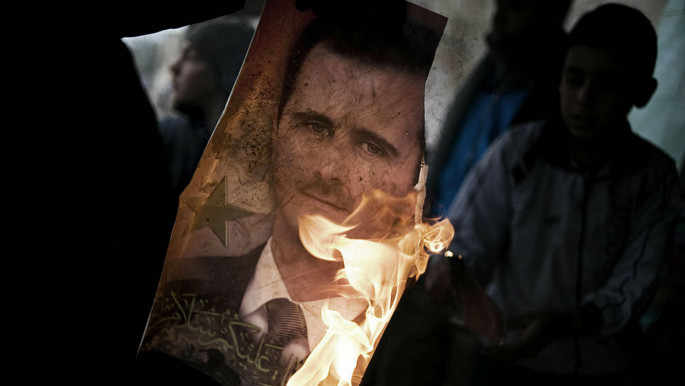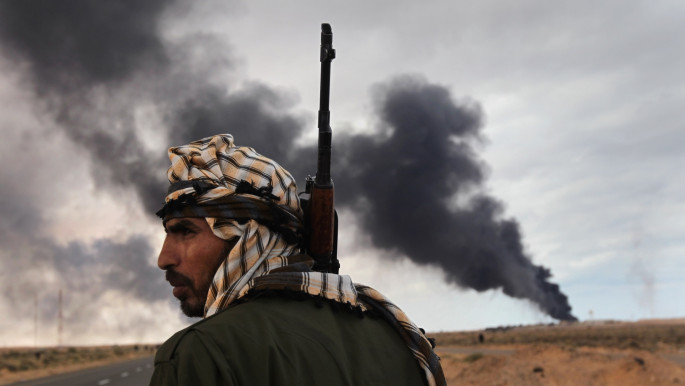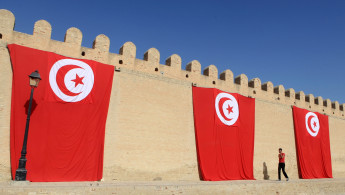The UAE's hidden hand in Tunisia's political crisis
"Whoever conspires against the Tunisian state has no place in it… The armed forces are ready in all times and places and will face vigorously anyone who encroaches upon the state or even thinks about transgressing its legitimacy," Saied said in a statement.
His comments came as a political crisis unfolds in Tunisia. A week earlier, prime minister Elyes Fakhfakh stepped down amid corruption charges, with members of the pro-old regime Free Constitutional Party occupying the parliament to demand the resignation of Parliamentary Speaker Rached Ghannouchi, the intellectual leader of the Islamist Ennahda party.
These latest developments raise questions about renewed interference from the United Arab Emirates (UAE) in its long-standing quest to sabotage Tunisia's democratic transition to exclude Islamists and establish a friendly government, and how Abu Dhabi's hidden hand may be manipulating recent chaos.
Abu Dhabi's counter-revolutionary agenda
Western observers have often hailed Tunisia as a 'model' for transition from dictatorship to democracy following the Arab Spring uprisings, which could inspire further regional democratisation. Yet for the UAE, this is a threatening depiction to its vision to redraw the Middle East and North Africa in its own authoritarian, anti-democratic image.
 |
The political crisis in Tunisia raises questions about renewed interference from the UAE in its long-standing quest to undermine the country's democratic transition |  |
Abu Dhabi has backed reactionary actors in Libya, Egypt, Bahrain, Sudan and Yemen, fearing that successful reforms and an upsurge of political Islamic factions could trigger calls for change within the UAE's own autocratic political system.
With its counter-revolutionary partner Saudi Arabia, the UAE began targeting the Ennahda party, which formed a government after the 2011 revolution, and, much to Abu Dhabi's angst, often exemplified how political Islam and democracy could intertwine. They also opposed Ennahda for its ties with Qatar and Turkey, which supported the post-revolution government.
 |
|
| Read more: Will the UAE defy the Caesar Act to continue normalisation of the Assad regime? |
Abu Dhabi initially courted the reactionary and secular nationalist Nidaa Tounes party, which hosted members of the old regime. Nidaa Tounes protested that Ennahda had lost legitimacy, and then joined a power-sharing coalition with Ennahda in Tunisia's first free presidential elections in 2014, with party leader Beji Caid Essebsi becoming president.
The previous year, protests against Ennahda occurred, and while there was genuine opposition towards Ennahda's mismanagement of the country, there were suspicions that the UAE may have played a role in stoking anti-Ennahda sentiment.
According to a journalist close to the former president, Emirati officials tried persuading Essebsi to forcibly seize power from Ennahda in exchange for financial aid after his victory. This aimed to "repeat the Egyptian scenario" where Abu Dhabi and Riyadh bankrolled the July 2013 military coup against Mohammed Morsi's democratically elected government, a model they have tried to replicate in Libya and Sudan.
Essebsi refused and never communicated directly with Abu Dhabi's Crown Prince Mohammad bin Zayed (MBZ), indicating a souring of relations between Tunisia and the UAE. By November 2015, Tunisian officials claimed that their Algerian counterparts had warned them and said they "were very unambiguous and said that they [the UAE] may try to destabilise Tunisia as it is at the moment."
 |
Western observers have often hailed Tunisia as a 'model' for transition from dictatorship to democracy following the Arab Spring uprisings |  |
Later, in June 2018, Lofti Brahem was dismissed as Tunisia's interior minister, with reports that he had collaborated with the UAE to stage a coup following Ennahda's victory in the previous month's municipal elections.
A clear obstacle for the UAE is that Tunisia does not have an overbearing military which is independent of the government, as is the case in Egypt. Therefore, the UAE has resorted to fake news campaigns and swaying individual politicians, which has mostly proven unsuccessful.
Political outsider and independent Saied's presidential victory in October 2019 in Tunisia's second free elections, with Ennahda also coming top and forming a coalition, shows that the country has largely withstood excessive Emirati interference.
 |
|
| Read more: A shaky start: Tunisian President Kais Saied's first six months in power |
Shifting Emirati stance or continued counter-revolution?
In what looked like a shift away from Abu Dhabi's counter-revolutionary agenda, MBZ tried to court Saied, calling him in April and allegedly discussing the coronavirus pandemic. Yet this came as Abu Dhabi sought greater regional support for its war in Libya and wanted Tunisia's blessing for its proxy candidate Khalifa Haftar, potentially even offering large sums of money.
However, Tunisia has not been swayed and has remained neutral over Libya. Meanwhile, as Abu Dhabi's ambitions in Libya have faltered, Rached Ghannouchi in May congratulated Libyan President Fayyez al-Sarraj's victories over Haftar, while he also supported Turkey's military intervention which rescued the internationally recognised government from Haftar's campaign.
Emirati and Saudi media have therefore ramped up their ongoing smear campaign against Ghannouchi and Ennahda to incite Tunisians against them. In June, Tunisian MP Abdel Latif Al-Aloui called on external powers to stop interfering in Tunisia, particularly singling out Emirati outlets Al-Ghad and Sky News Arabia, suggesting the message was directed at Abu Dhabi.
 |
Political outsider and independent Kais Saied's presidential victory in October 2019 shows that the country has largely withstood excessive Emirati interference |  |
According to the independent Algerian newspaper El Watan, Turkish intelligence agencies foiled another alleged UAE-backed coup attempt last May. Security forces broke up an anti-government rally in Tunis on 14 June calling for the dissolution of parliament and early elections.
The Salvation Front (Harak al-Aksheedi), whose Facebook page is run by individuals living in the UAE, organised the demonstration. The London-based Al Quds al-Arabi reported that the protests were part of an alleged ongoing Emirati coup attempt.
The current polarisation against Ennahda in parliament gives the UAE greater opportunities to isolate the party and get its way. Abeer Moussa, head of the reactionary, pro-old regime Free Constitutional Party, has frequently appeared on Emirati media, and received praise from Dubai's former police chief. She shares Abu Dhabi's hostility towards Ennahda, Qatar and Turkey, as well as favouring the old regime. She has also pushed to classify the Muslim Brotherhood as a terrorist organisation, another Emirati talking point, and allegedly receives Emirati funding.
 |
|
| Read more: Divided Europe: How the West lost influence in Libya's war |
In July, the party staged an occupation of parliament to disrupt the process of a new prime minister from being chosen after Fakhfakh's resignation. This also aimed to further weaken Ennahda's influence in parliament.
And given Abu Dhabi's support for hostile, reactionary forces elsewhere in the region, it would not be surprising if the UAE even encouraged Moussa to stage her disruptive move. Nonetheless, there are clear indicators of Abu Dhabi building a steady relationship with her party.
Ultimately, the UAE may be aiming to stir up enough chaos in Tunisia's parliament and exploit grievances on Tunisia's streets to push forward a pro-Emirati candidate to take control of the country, ideally one that supports the former Ben Ali regime, and dismantle its nemesis Ennahda.
However, on 26 July, Interior Minister Hichem Mechichi was appointed prime minister, and is now tasked with forming a government within one month and winning a vote of confidence, or new elections will be held within three months. Any further Emirati attempts to sabotage this process will likely struggle to achieve its desired results, given its past failed attempts to form a counter-revolution in Tunisia and growing domestic awareness of its actions.
It may however succeed in somewhat isolating Ennahda. Such activities may also present road bumps to Tunisia's smooth democratic progression. Continued local knowledge of this, and genuine external support from the international community for Tunisia's democracy, will help create more safeguards and minimise any damages.
Follow him on Twitter: @jfentonharvey



